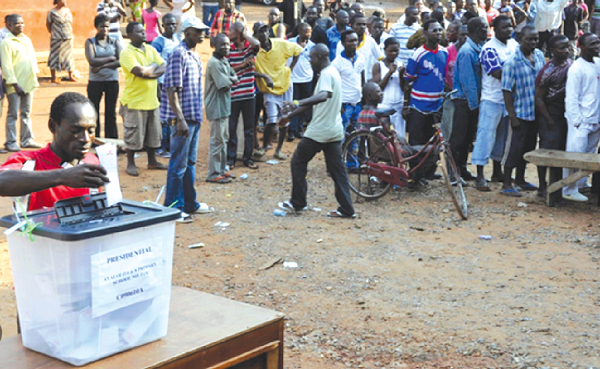
Does voting make a difference?
In 2020, I had a long conversation with a family member the day before election. This family member had originally decided not to vote mainly because “voting makes no difference.”
Advertisement
After a lengthy conversation, I was able to persuade her to go out and vote, but I recall my persuasion was framed more as a matter of civic duty and responsible citizenship than as a matter of “voting makes a difference.”
As another election approaches, I am having the same conversation with a good friend who has decided not to vote in the upcoming presidential and parliamentary elections. I asked her if voting makes a difference and here is how she answered - “I know it does. But I have become too apathetic to care because of the leadership patterns I have experienced over the past three decades.”
Let me add that my good friend is not the only one expressing this sentiment of not voting in the upcoming election. The most recent Afrobarometer survey (Round 9, 2022), showed that as many as 28 per cent answered “would not vote” when asked about their voting intentions.
So here I am, confronted again with the question – does one’s vote make a difference?
The question can be examined from the two angles – a) what Ghanaian voters have said in polls and surveys and b) the governance outcomes after a particular election.
Voters
In 2020, the Ghana Centre for Democratic Development (CDD-Ghana) asked respondents in their pre-election survey which of the following statements they agreed with - “Statement A. No matter whom we vote for, things will not get any better in the future; Statement B. We can use our power as voters to choose leaders who will help us improve our lives.” Only 10 per cent agreed with Statement A, while 79 per cent agreed with Statement B.
The Afrobarometer survey has also asked Ghanaians about the efficacy of voting. Across four rounds of the survey (2005, 2008, 2014 and 2022), Ghanaians were asked “How well do elections enable voters to remove from office leaders who do not do what the people want?” Cumulatively, 71 per cent expressed belief that our elections do well by “enabling voters remove from office leaders who do not do what the people want.”
Interestingly, from the National Commission on Civic Education’s election year report titled Matters of Concern To The Ghanaian voter, the 2016 and 2020 studies revealed that the number one reason why Ghanaians are willing to vote in presidential elections is to “exercise their civic responsibility.” For parliamentary elections, it is for development.
Nonetheless, the sentiments of Ghanaians can be summarised as follows - even if civic responsibility and development are key motivating factors for voting, there is generally a belief that voting does make a difference whether it is a) in anticipation of the good that elections will produce or b) as a corrective measure to remove nonperforming leaders from office.
Election outcomes
“Elections have consequences” goes an old age. I do agree that elections have consequences. The leaders we choose and entrust state power and resources with make decisions that affect the everyday lives of citizens. Over the course of the fourth Republic, we have had eight elections and five different Presidents. Our two main political parties (NDC and NPP), at the end of President’s Akufo-Addo’s term, would have governed the country 16 years each for a combined total of 32.
The good governance, economic and standard of living consequences have varied, not just across the reigns of the two political parties, but also across the reigns of the five Presidents elected so far. And it is based on the varied outcomes that the answer to the question “does voting making a difference” is an unequivocal “yes.”
I believe the difficulty of anticipating a positive difference, once elections are over, is the reason why some voters choose not to vote or have become skeptical about the difference voting makes.
But the more I reflect, the more I realise that no voter knows with any certainty, what kind of difference, positive or negative, their vote is going to make. Indeed, voters cast their votes in anticipation of a positive difference at both the individual and collective national level. Voters cast their votes in anticipation of leaders being able to move the development needle in a positive direction.
So, if voting makes a difference, but voters seem uncertain about guaranteed positive outcomes after elections, what are they supposed to do? I am reminded of the words of Former United States President Bill Clinton – “vote your hopes and not your fears.”
And if I may add, do ask yourself “who can I most trust my hopes with?”
The writer is the executive director of democracy project, a political think tank.




